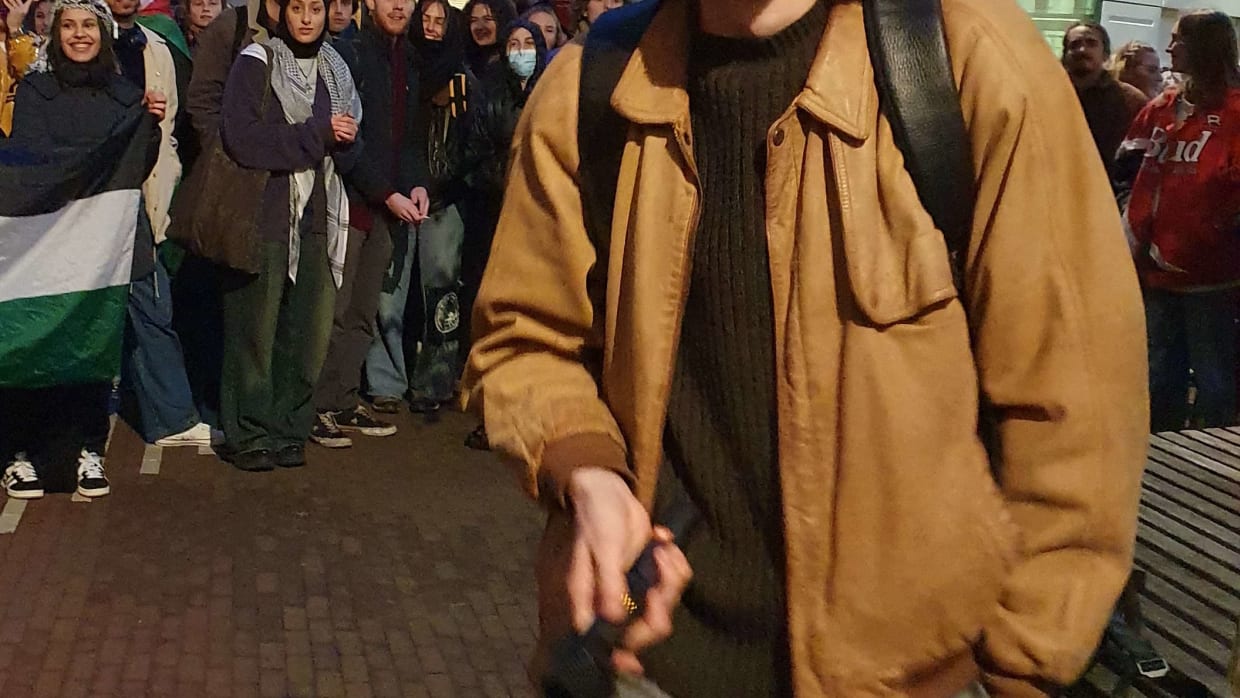
Kirsty McHenry | Is the UvA waving goodbye to Palestinian flags?
It is somewhere bitter that red, white and blue flags were so rampant during King’s Day, while at the UvA Palestinian flags are no longer welcome, writes columnist Kirsty McHenry. “It demonstrates how, in the Netherlands, frank displays of national pride may be freely enjoyed, all the while Palestinian slogans, symbols and even the flag itself are disproportionately politicised and labelled as violent.”
Last Saturday, as I pushed through the drunken sea of orange that is the King’s Day crowd, I became suddenly, soberly conscious of the many Dutch flags that surrounded me. The Dutch tricolour was displayed everywhere I looked: from tiny, smudged flags painted on the cheeks of passersby to full-sized flags that had been hastily tied to crowded balconies. This was hardly a surprise. I was in the Netherlands during the country’s national holiday after all; decorating the city with the national flag is a traditional part of Dutch festivities. But, standing in the midst of all that red, white, and blue (and orange), it just served as a reminder that Palestinian flags are now banned at the UvA.
Only a couple days before King’s Day, the ABC Hall on the Roeterseilandcampus was once again filled with protesters demanding an academic boycott of Israeli institutions (the UvA’s adamant refusal to do so has inspired such demonstrations to become a near weekly occurrence). However, at this demonstration, unlike many of those that happened previously, the UvA administration forced the protesters to remove all the Palestinian flags which they had hung up around the hall. According to the administration, Palestinian flags are in and of themselves a political statement and as such, are banned under the house rules. Although the administration has taken issue with terms like “intifada” and the slogan “from the river to the sea” in the past, this demonstration was the first notable incident in which the Palestinian flags themselves became the principal subject of contention.
The UvA’s restriction of the flags is confusing at best. This is not helped by the fact that the house rules, which the administration used to justify its decision, remain so vague that it is hard to anticipate what will and will not be tolerated from one day to the next. In response to accusations of a double standard which were made in reference to the UvA’s blue and yellow Ukrainian poster campaign back in 2022, the administration decided to retroactively change its line. When confronted, it now professes regret for supporting Ukraine through such boldly coloured means. Needless to say, any flag has the potential to be perceived as a political symbol but whether most of these flags would then be considered a violation of the house rules seems unlikely. Instead, the administration’s reaction to the sight of Palestinian flags suggests that they are more concerned with stripping the campus of all recognition of Palestine in particular.
A few hours after the removal of the Palestinian flags and banners at the demonstration, several protesters defied the administration by putting them back up. This led to further arguments breaking out between the administration and the protesters as some members of the administration tried to forcibly remove the flags and banners themselves. Following this, many of the students involved in the protest were filmed by members of the administration, asked for their student IDs, and in some cases, threatened with the possibility of expulsion.
The events at the UvA demonstrate how, in countries like the Netherlands, frank displays of national pride may be freely enjoyed, all the while Palestinian slogans, symbols and even the flag itself are disproportionately politicised and labelled as violent. Consequently, as I stood there on King’s Day, surrounded by many hundreds of Dutch flags waving everywhere around me, I found it difficult to ignore the prickling sense of hypocrisy.

